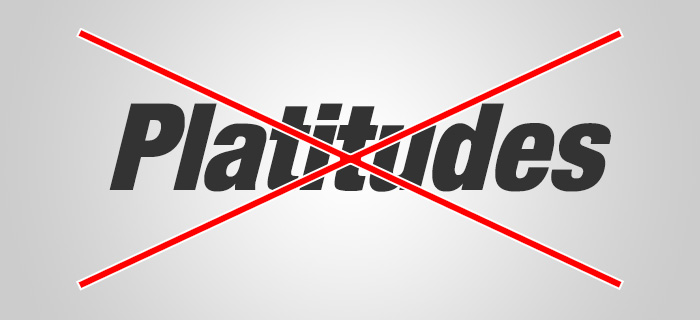Apologia
Platitudes

I think our culture suffers from too many platitudes. First, I will define the notion of platitude. Second, I’ll set out some popular platitudes plus offer humorous but critical responses.
According to Cambridge Dictionary, a platitude is “a remark or statement that may be true but is boring and has no meaning because it has been said so many times before.”
According to Wikipedia, “A platitude is a trite, meaningless, or prosaic statement, generally directed at quelling social, emotional, or cognitive unease. Platitudes are geared towards presenting a shallow, unifying wisdom over a difficult topic. However, they are too general and overused to be anything more than undirected statements with ultimately little meaningful contribution towards a solution.”
A platitude, in other words, is a claim that seems thoughtful but actually isn’t.
Consider the following platitudes (sometimes they are memes on the internet and sometimes they are clichés), and consider my responses. Hopefully, we can chuckle at some of them. Hopefully, too, we can learn to be more careful in our use of language.
“Live like there’s no tomorrow.” Yeah, I tried that. My Visa bill was huge.
“Be all you can be – reach your potential.” Yeah, but not you Ted Bundy, Josef Fritzl, Robert Pickton, Adolf Hitler… and all the rest of us who recognize – and especially those who don’t recognize – the darkness within.
“Be who you are.” Yes, but what if I’m a bully? A racist? A hater?
“Whatever makes your soul happy, do that.” Really? Bullies and tyrants thrive on this.
“Just do it.” No, don’t. Please put the gun down.
“If it feels good, do it.” No, don’t. Especially if you’re a pedophile.
“You are what you feel.” Not so. What if you feel overweight when you actually aren’t (a.k.a. anorexia nervosa)? Should you get liposuction because that’s what you feel?
“A girl should be two things: who and what she wants” (Coco Chanel). Yes, but didn’t Karla Homolka think this? Karla and her husband Paul Bernardo raped and murdered three young school girls, one of whom was Karla’s sister Tammy.
“An assisted dying law would result in fewer people suffering.” Yeah, right. Just as a kill-the-homeless law would result in fewer homeless people.
“Abortion should be allowed because it reduces the number of unwanted children.” Umm. So we should kill the unwanted kids in the streets of Thailand?
“We need a change” (said at political rallies). Well, that depends on what that change is. Is the proposed change better? Or worse?
“Be progressive.” Progressing towards what? The dark side?
“Our strength is in our diversity.” Yeah, but I just want a mechanic who can actually fix my car.
“Love is love is love.” Okay, but what about the businessman who loves his secretary and thus decides to leave his dying wife and their two young children? What about the pedophile who loves children and wants to have sex with them? What about the zoophile who loves his horse?
And what about the sadist who says “I love you” to his torture victims? And what about the masochist who says “I love you” to encourage her abuser?
Clearly, we must define “love.” Love has a moral structure. A belief content. A truth content. Oh, and if you don’t agree, then I think you shouldn’t be a schoolteacher – or at least never be left alone with young children.
“Be a difference-maker.” Yes, but that difference will be better if it centers on the True, Good, and Beautiful.
Many thanks to daughter-in-law Brittney van der Breggen for suggestions for this column and for proofreading.
Hendrik van der Breggen, PhD, is a retired philosophy professor (formerly at Providence University College, Manitoba) and author of the book Untangling Popular Pro-Choice Arguments: Critical Thinking about Abortion, and Untangling Popular Pro-MAID Arguments: Critical Thinking about Medical Assistance in Dying (in Canada).




